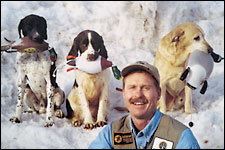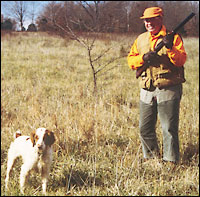What should you expect of a pointer, retriever or flushing dog that is started?
By Jerry Thoms
 Depending on the breed, any "started" gun dog should have some demonstrable abilities as a hunter. Tom Dokken, a trainer and breeder of Labs, has some specific ideas on defining started gun dogs of all breeds. |
"Started dog" ads often catch the attention of upland bird and waterfowl hunters. Whether they're looking for a new canine hunting companion or just comparing their own present pointer, retriever, or flusher to what's advertised, wingshooters who read these ads are often surprised at the high prices of trained gun dogs. And, they're always mystified at the definition of a "started" dog that's being offered for sale.
"'How can any gun dog sometimes only a little over a year old be worth $1,500 to $2,500?' is a question I sometimes hear from people calling in response to our occasional ads for started Labradors," said Tom Dokken, a full-time dog trainer and breeder of Labrador retrievers at his Oak Ridge Kennels in Northfield, Minnesota.
"My answer to this question is pretty standard. I tell them that our typical started retriever is a fully functional hunting dog that has been trained to retrieve ducks and geese from land or water. And, our started Labs will also hunt for, flush, and fetch any upland gamebirds such as quail, grouse, and pheasants," Dokken said. "In addition, these dogs have been trained to come in, whoa, and sit on voice commands or whistle signals. Likewise, they will take some basic hand signals when retrieving. And, of course, these dogs have all been socialized around other dogs and with people, are broke to gunfire, and will be steady to shot in a waterfowl blind or a field-hunting situation," Dokken added.
"Our started dogs will also know how to kennel up, will be comfortable with staying and traveling in a dog crate, and will be calm and collected in a duck boat or field blind--all important details for making the dog's company a pleasant and valuable experience on any kind of hunting trip. And all of them can also become good house dogs," Dokken said.
 A started dog should hunt and find any gamebird and be trained to retrieve all wounded and dead bird. |
"Some of our started retrievers are field-trial dogs that have been dropped from the trialing program because they don't have the 'fire' necessary to do well in competition," Dokken pointed out. "Most of these ex-field-trial dogs--Labradors in particular--make good started dogs, however, because they have great genetic backgrounds, have always been well trained, and have great potential as laid-back, easy-going, talented hunters."
Though I've never added up the hours necessary for a professional gun dog trainer to bring a retriever to the started status, I can guess that any amateur who has trained any gun dog to do this stage of development will know about all the time and effort involved in the process," Dokken said as a way to explain the $1,500 to $2,500 or even higher price tag on a started gun dog.
"A started 'versatile hunting dog' or any breed of pointing dog for $1,500 to $2,500 might seem awfully expensive to anyone who doesn't know much about training," said Jim Rieser, a veterinarian, a breeder and trainer of German shorthair pointers, and a judge in the North American Versatile Hunting Dog Association. "But talk to any professional gun dog trainer who sells a started dog for $2,500 and many of them tell you they're making about $5 an hour for all the time and effort invested in the final product," Rieser added.
"For those hunters who want to buy a 'started' pointer, I suggest looking for a dog that has gone through the North American Versatile Hunting Dog Association testing program," Rieser said. "Look first for a pointing breed that has scored well in the Natural Ability (or Puppy) Test. This will provide an objective appraisal of the young dog's innate and potential abilities to search for, point, track, and retrieve gamebirds," Rieser said.
 "Started" dogs are perfectly functional hunters and are ready for the field. This started Labrador has found and pushed up a pair of roosters for the gun. The dog can be expected to flush upland birds, be well conditioned to gunfire and retrieve all game. It will also be trained to deliver ducks and geese from land or water and be quiet and comfortable in the blind. |
"Likewise, look for a started dog that has done well in The NAVHDA Utility Tests. Any dog that passes this test will have been certified by three qualified NAVHDA judges to consistently quarter in the field, point upland gamebirds, track any running birds, and retrieve wounded and dead game on land and from water," Rieser emphasized.
"AKC Hunt Test scores also provide some further quantifiable information on the training level and performance rating of a started dog," Rieser adds. "Also consider any hunting contest wins if a 'for sale' started dog has been in competitive events such as those sponsored by the National Shoot To Retrieve Association, for example," Rieser suggested.
"Of course, be certain that any breed of started gun dog has certified hips, elbows, and eyes, and is otherwise physically sound according to a veterinarian's thorough examination," Dr. Rieser emphasized. "There's a big heartbreak that comes from spending thousands of dollars for a dog only to discover too late that it has a genetic defect, especially one that could have easily been detected if the dog had been examined before you bought it."
"Though everyone who trains and sells any kind of spaniels might have a different general definition of a 'started dog,' I can give you a specific description of my idea of a 'started' English cocker," said Larry Hansen of Tracy, Minnesota. Hansen has a sense of conviction based on 20 years of raising, training, field-trial campaigning, and hunting this breed, as well as selling started English cockers.
 A started gun dog, whether the pointing, retrieving, or flushing type, should be socialized and ready to bond with a new owner. |
"A 'started' English cocker should come, hup, and kennel, as well as find, flush, and retrieve, gamebirds," Hansen says. "Come, hup, and kennel, are self explanatory. By find gamebirds, I mean the dog should quest in search of game, as some British trainers put it, or quarter in the field, as Americans usually say it."
Likewise, to flush and retrieve means the started dog should, on command, push found gamebirds into the air and pick up, carry, and deliver shot birds to hand. That means bringing them all the way to where the shooter is waiting. . .and it also means to retrieve out of water," Hansen added.
"To better understand the definition of started spaniel we can compare it to a 'finished dog' that will do the same things, but will also take hand signals and do blind retrieves, be steady to flush and shot, and have at least one full season of gamebirds (not pigeons) shot over it," Hansen argued. "A finished spaniel can sell for $5,000 or more," Hansen pointed out.
"The advantages of buying a started dog is that you have a pretty good idea of what you're getting in terms of what the dog will do. Many trainers, in fact, will guarantee a started dog so that if, for example, it doesn't consistently retrieve to hand, the seller will 'tune it-up' so it will," Hansen said.
 Jim Rieser says started versatile dogs can be found by going to NAVHDA and AKC hunt tests, talking to pro trainers, and checking out ads in hunting magazines. |
"Likewise, anyone who buys a started dog should expect to get a complete demonstration of all the dog's abilities to perform in the field and in the water. In addition, the buyer should get a short-course from the seller in handling the dog in a wide variety of hunting-type situations," Hansen continued. "I train some of my English cocker spaniels to hunt cottontail rabbits, in addition to gamebirds, so that skill will be added to my definition of some started dogs," Hansen explained.
"The price of a started English cocker spaniel from my kennel will be $1,500 to $2,500 depending on the dog's degree of development. Some dogs that are more precocious and have proven themselves while in training will have the higher cost," Hansen emphasized. "Isn't that a lot of money for a gun dog?" Hansen is sometimes asked.
"Sure it is," he answers. "But compare that to the $500 to $800 for a well-bred seven-week-old pup you could buy and add on a year's worth of your time and effort to train it to the started phase. Then consider the possibility of taking the dog to a professional trainer to help you with problems you can't handle. That could easily come to another $500 or $1,000. And if you do all this training yourself, you still can't be sure of the final product or have a guarantee of a reliable started dog," Hansen always emphasizes.






